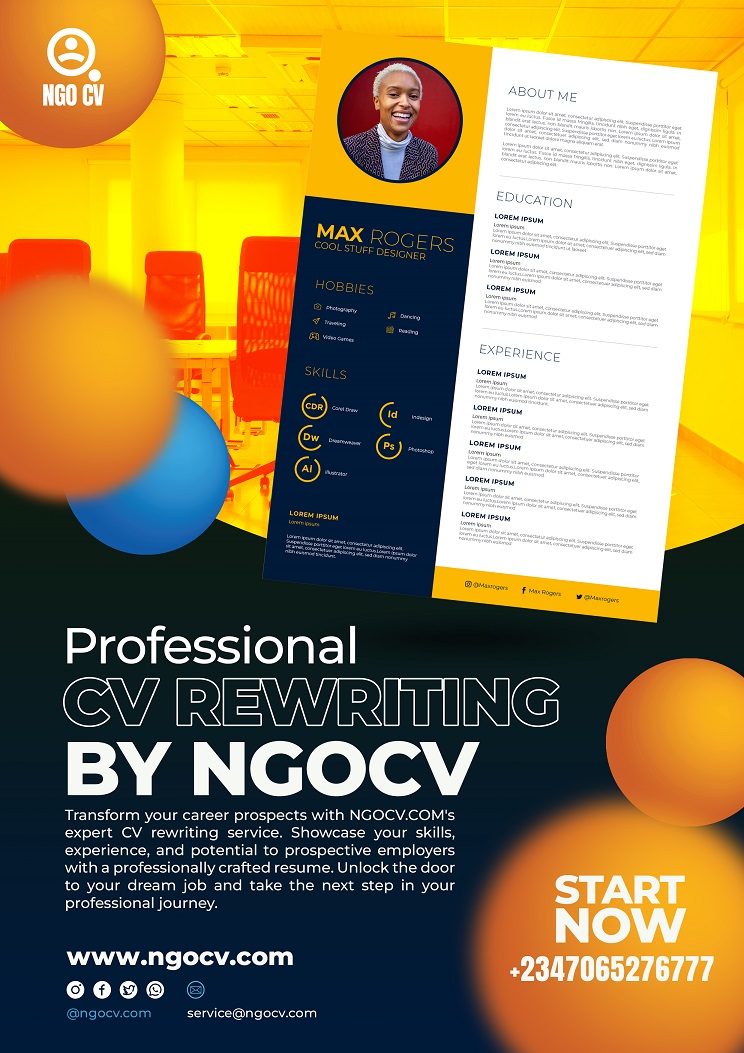
TERMS OF REFERENCE FOR CONSULTANT TO CONDUCT POLITICAL ECONOMY AND FISCAL SPACE ANALYSIS IN PINNS 2.0 PROJECT STATES: REFERENCE: CS-SUNN/2021 – 11/0005
About CS-SUNN:
The Civil Society Scaling-Up Nutrition in Nigeria (CS-SUNN) is a non-governmental, non-profit making alliance, made up of organizations with a shared vision to transform Nigeria into a country where every citizen has food and is nutrition secured. We pursue this lofty goal by engaging government and non-state actors to raise awareness, sustain commitment and actions to effectively tackle under-nutrition in Nigeria. The alliance was birthed in November, 2013 at Ilorin, Kwara State, Nigeria, and formally inaugurated on the 7th of August, 2014.
About PINNS 2.0 Project
The Partnership for Improving Nigeria Nutrition Systems (PINNS 2.0) is a project designed to strengthen the Nigeria nutrition systems to be more Result-driven, Effective, Serviceable, Efficient and Transparent (RESET). This is to facilitate the delivery of nutrition interventions and to hold government accountable on commitments made to allocate, release and use funds transparently for implementation of high-impact nutrition interventions in Nigeria through evidence-based advocacy**.**
Several factors, including lack of food, improper feeding and caring practices, economic and political structures, low status and lack of education among women, and others, cause malnutrition in Nigeria. Therefore, a multi-sectoral approach is required for reduction and eventual eradication of the scourge. The UNICEF conceptual framework (UNICEF 2013) brings to the fore the need for multi-actors, disciplines, sectors and systems in this effort as evidence increasingly suggests that solving malnutrition can benefit from a systems approach (WHO 2009; Hammond & Dube’ 2012).
The project is a continuation of the just completed PINNS 1.0 and connects the importance of optimal nutrition to attaining Nigeria’s Human Capital Development goal by 2025. The project will continue to support the Nigeria nutrition system to be more Result-Driven, Effective, Serviceable, Efficient and Transparent (RESET).
PINNs project adopts a systems approach to strengthening bodies burdened with the responsibility of reducing malnutrition in Nigeria. It pays attention to the unpredictable interaction among factors, sectors, disciplines and determinants of nutrition, bringing to the table key tools and technical support required for the effective coordination and implementation of programs. PINNs seek to focus on strengthening governance, policy implementation, effective coordination, financing, building the capacity of state actors, generation and effective communication of evidence, and promoting accountability. This collective effort will contribute to a reduction in malnutrition, improving the nutritional status of Nigerians, particularly women and children. The organizational capacity of CS-SUNN to become a leading voice on nutrition advocacy in Nigeria by deepening expertise gained from the Partnership for Advocacy in Child and Family Health (PACFaH) project and building new ones is also one of the goals the project intends to achieve.
Country/State-Specific Political Economy Analysis in the Health and Nutrition Sector
The CS-SUNN requires the services of a consultant to coordinate county-specific Political Economy Analysis (PEA) of the health/nutrition sector in Nigeria with a special focus on Lagos, Kano, Nasarawa, Kaduna, and Niger State. It is the expectation of CS-SUNN that the Political Economy Analysis will contribute to a shared understanding of the current context and how it affects Health and Nutrition programming; broaden the scope for informed dialogue and ownership among stakeholders; inform the Theory of Change for Nutrition policy advocacy in Nigeria; inform risk management and scenario planning; and help identify partners to work with.
Scope of Assignment
The consultant will provide the overall coordination, supervision, and quality assurance of the political economy analysis of the health and nutrition sector. The in-country political economy analysis seeks to identify the critical drivers of change, including power structures, formal and informal institutions, and actors or agents that influence access to good health and nutrition. Emphasis will be on context, power, institutions, actors, relationships, and processes. The review will test the explicit and implicit assumptions about the influence and interests of stakeholders and how power is exerted in a specific institutional and individual context that underlies policy orientation and implementation, as well as attitudes and behaviors.
Specific Objectives of the Assignment
- To identify the key power relations, dynamics and trends in governance systems, structures and processes related to health/nutrition in the assessment locations. This should include overt and covert intermediaries, values and norms for decision making, as well as enabling institutions both formal and informal for nutrition.
- To undertake a stakeholder mapping and power analysis for Nutrition with a view of identifying overt and covert power brokers, structures and systems that enable these power brokers, incentives and rewards for the intermediaries and the formal and informal institutions enabling perpetuation of the perceived or real power of these power intermediaries.
- To establish the current roles of women, youth, men, key populations and other groups in decisions and actions related to access to adequate nutrition.
- To identify key obstacles that prevent active and influential advocacy and use of evidence for transparent, accountable, and inclusiveness to access to adequate nutrition.
- To identify key enablers that promote and influence advocacy and use of evidence for transparent, accountable, and inclusive access to access to adequate nutrition.
- To provide recommendations on both immediate and long-term approaches/strategies that CS-SUNN and other stakeholders can use to ensure transformative policy advocacy agendas addressing stakeholder needs.
Methodology
CS-SUNN expects an in-depth, evidence-based, critical analysis and wider consultation with various stakeholders, including civil society, partners, INGOs, and governments at the country level. The PEA must deliver informed insights and reflections with practical recommendations. As part of the design, the methodology must be presented and mutually agreed upon before implementation. At a minimum, the methodology must include:
· A thorough literature review that uses up-to-date data and information from credible sources.
· Consultation with key CS-SUNN/PINNS 2.0 staff and partners to ensure the analysis is designed in a way that will meet required needs.
· Key informant interviews with a diversity of actors, such as governments / local authorities, local community, civil society, international institutions, and the like.
· Presentation of the PEA for a validation workshop and revisions made according to discussions.
The study will use both quantitative and qualitative data collected from both primary and secondary sources. A protocol will be developed and submitted for approval. The data should be robust, verifiable, and collected using ethical practices. The consultant will propose a method for analysis and subsequent presentation. The report should be presented in a logical, strategic, reader friendly and simple language.
Deliverables
Phase One
- An Inception matrix that includes final work plan and methodology for the assignment.
- Data collection and analysis tools for the study.
- Draft PEA finding report for purposes of initial decision making
Phase Two
- A stakeholder workshop to validate PEA findings.
- Final policy brief and fact sheet
- Final Report for the national and each project state.
The written report will be:
· The report should not exceed 30 pages, excluding annexes and references to be submitted on an agreed deadline.
· The summary should not exceed 5 pages.
· The policy brief should not exceed 3 pages.
Confidentiality of information: All documents and data collected will be treated as confidential and used solely to facilitate analysis. Interviewees will not be quoted in the reports without their permission.
Content: All the required documents and reports in their draft and final versions shall be submitted to CS-SUNN within agreed timelines and shall remain the explicit property of CS-SUNN.
Requirements and Selection Criteria for the Consultant
Criteria
Requirement
Education
Master’s degree in development, social science, political science, or related field
Experience
At least 7 years’ experience in the field of policy, governance, health, water and sanitation or related field.
Proven experience conducting PEAs (an example of relevant previous work mandatory and will be kept confidential if required).
Proven experience working with government authorities as well as civil society organizations and academic institutions.
Proven experience in coordinating or leading similar projects.
Understanding of the Terms of
reference
Shows clear understanding of the political economy analysis approach; clear methodology and the outputs expected from the assignment.
Time management
Shows ability to work autonomously and to deliver the PEA in a timely fashion.
Consultancy Period.
The period of this consultancy will be approximately 20 pro-rated working days, starting in November 2021 and ending on December 2021.
Management
All reports are subject to review and authorization by CS-SUNN’s PINNS 2.0 project manager**.**
How to apply
Bid Requirements
Consultants who meet the requirements of this assignment should submit an Expression of Interest of MAXIMUM 5 PAGES, which should include the following:
- Suitability statement that expresses commitment to availability for the entire period of the assignment.
- Cover letter of no more than one page- attached separately.
- CV of lead consultant totaling no more than 3 pages- Attached separately.
- Contact details of at least three referees.
- Preliminary proposed PEA process, including basic context analysis, methodology, report structure and timeline informed by this ToR.
- A phased out indicative budget of including all expected costs but broken down to demonstrate what each cost covers.
- All text in size 12 font, single-spaced and with standard margins.
Application
Interested candidates should send their complete offer via mail to [email protected] on or before Friday 18th of November, 2021.
Please address correspondence to:
The Executive Secretary,
Civil Society Scaling-up Nutrition in Nigeria (CS-SUNN)
Plot 203 Cadastral Zone B02, Off Oladipo Diya Way (Beside Coded Suites), Durumi District, Abuja.
Successful consultants will be contacted for a formal meeting **




